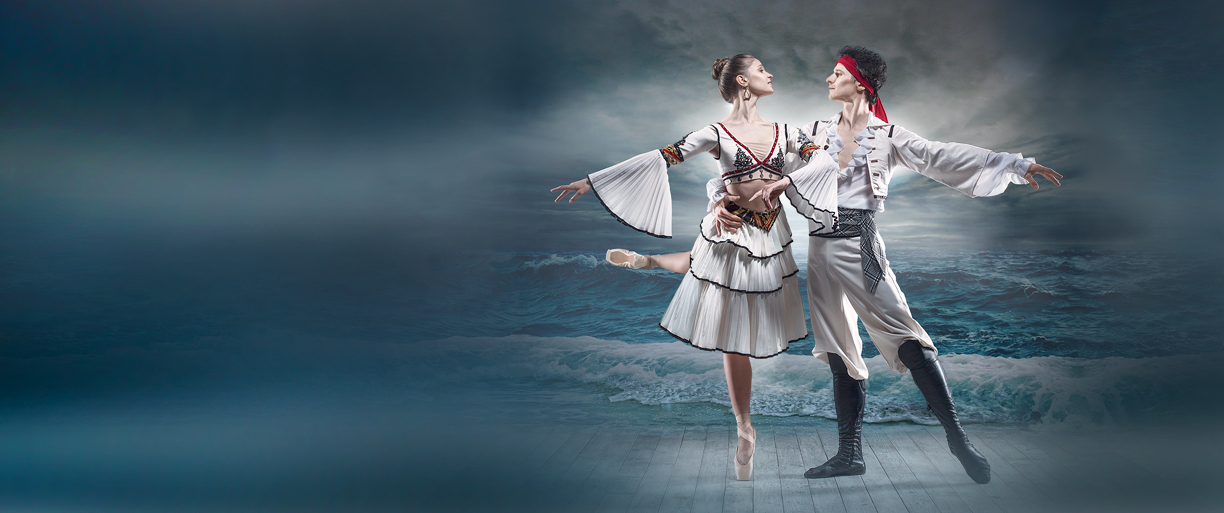
STARRING IVAN VASILIEV
Le Corsaire
ballet in two acts
music by Adolphe Adam, Cesare Pugni, Léo Delibes, Riccardo Drigo, and Pyotr Oldenburgsky

Cast
Adolphe Adam in 15 years after creating Giselle produced another cornerstone of the ballet classical repertory, the ballet Le Corsaire. The scenario based on the poem by Lord Byron was written by Henri Saint-Georges and ballet master Joseph Mazilier. It was Mazilier who staged the new ballet. The premiere took place in Théâtre Imperial de l’Opéra in Paris on January 23, 1856. Two years later on January 12, 1858, the ballet was staged at the Bolshoi Theatre in St Petersburg. French ballet master Jules Perrot, a co-author of Giselle, who worked in St.Petersburg in
Later the ballet was staged several times in different versions revised by different choreographers and composers though all the versions were based on the version by Mazilier, Perrot and Petipa. Our theatre first turned to the ballet in 1955. The artistic team included Yury Slonimsky, an expert in classical dance, ballet master Pyotr Gusev, conductor Evgeny Kornblit, and designer Simon Virsaladze. The idea of the new version was to find the motivation for every character of the ballet. Later, in 1968, Pyotr Gusev created a three-act ballet which was on at the Mikhailovsky Theatre till 2009.
New times suggest new approaches. Farukh Ruzimatov, a brilliant performer of the role of Ali, presented a new version of Le Corsaire: «On the basis of the ballet by Marius Petipa and Pyotr Gusev existing in the theatre we tried to create a new, more dynamic, bright and showy ballet.»
Prologue
The ship of corsairs has sunk in a severe storm.
Act I
Scene 1. Ashore.
There are only three corsairs survived: Conrad, the leader of the corsairs, and his friends Ali and Birbanto. Young Greek girls are dancing and amusing themselves on the shore. Two of them are the most enchanting ones — the Greek beauty Medora and the Turkish beauty Gulnara. The girls find the corsairs and hide them from the ferocious Turkish soldiers who are entitled to execute corsairs immediately on site. Isaac Lankedem, a cunning slave-trader, who has brought the Turkish soldiers is looking forward to captivating the girls. He takes all the girls on the slave market along with languishing Palestinian girls and wild Algerian boys.
Conrad who has fallen in love with Medora at first sight hopes to save the girl and follows her in disguise.
Scene 2. Slave market.
Hustle and bustle of the oriental market. Seid Pasha, the ruler of the island, has chosen Gulnara for his harem. Medora is doomed to share her destiny. Suddenly some strangers appear willing to take part in the trade. However, Seid Pasha is the richest man on the island. The strangers throw off their cloaks and reveal themselves as armed corsairs.
Conrad carries Medora away. Ali captivates Lankedem. Birbanto and others seize the gold, the draperies, the arms, and the prisoners.
Seid Pasha is furious and confused.
Conrad shows his possessions to his beloved Medora. The corsairs are happy with their loot and new girlfriends — the Greek and Palestinian girls. Wild Algerian boys are welcomed to the fellowship of buccaneers. Conrad’s bosom friend Ali keeps an eye on captivated Lankedem. On Medora’s request Conrad sets the captivated girls free. Birbanto, however, is not satisfied with the decision: he’s entitled to a part of the jewels and some girls. Conrad is surprised with Birbanto’s protests. Although Conrad manages to persuade Birbanto, the latter nurses a grudge against the leader of the corsairs.
Cunning Lankedem provokes Birbanto to revenge. The slave-trader suggests sending Conrad to deep sleep and bringing Medora back to Seid Pasha.
Conrad is swept away by his love to Medora. Lankedem pours sleeping potion to their wine which unsuspecting Medora offers to Conrad. He drops on the spot. Medora asks for help but insidious Birbanto abducts her back to Seid Pasha’s harem.
Conrad awakes. He asks Birbanto about Medora. Birbanto foxes and lies. Conrad rushes to save his beloved again.
Act II
Scene 3. Palace.
Seid Pasha is delighted with Gulnara’s naughtiness. The pretty Turkish girl, however, is just coquetting and not going to indulge the ugly old Pasha.
Lankedem brings Medora back to Pasha. Gulnara takes the girls to her chamber. Eunuchs announce the arrival of pilgrims. After the evening prayer Seid Pasha invites the pilgrims to enjoy the dances of the girls in his harem. Medora and Gulnara are the brightest flowers in the splendid garden of the harem.
Birbanto and Lankedem reveal the corsairs. Conrad and Ali attack the traitors. During the fight Seid Pasha escapes. Birbanto and Lankedem are subdued.
Epilogue
Ali has saved Gulnara who entrusts her life to the courageous corsair. Conrad and Medora start a new happy life together.
Premiere at the Mikhailovsky Theatre: 13 March 2009
Back on stage: 14 February 2019
Scenario by Jules Henri Vernoy de Saint Georges and Joseph Mazilier edited by Yury Slonimsky and Pyotr Gusev
Choreography by Jules Perrot, Marius Petipa, and Pyotr Gusev revised by Farukh Ruzimatov
Choreographer of the Palestinian and Algerian dances and the fight of the corsairs: Georgy Kovtun
Stage Designer, Lighting Designer: Valery Levental
Lighting Designer: Mikhail Mekler











